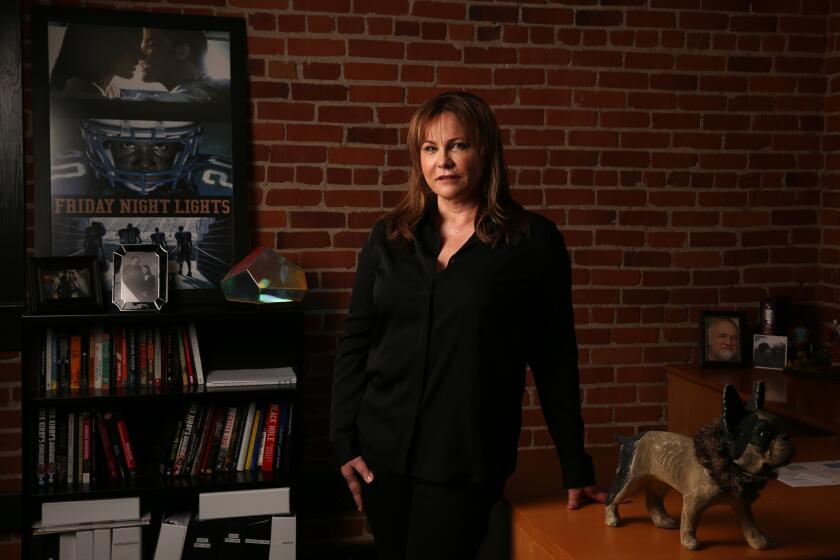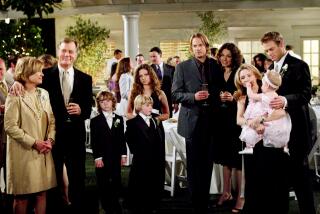Yes, ‘The Morning Show’ has a #MeToo problem. That’s the best thing about it
- Share via
In a scene from the third episode of “The Morning Show,” Mitch Kessler (Steve Carell), a formerly beloved news anchor who’s recently been fired from a morning news program following charges of sexual misconduct, is commiserating with a director, played by Martin Short, accused of more egregious transgressions, including rape.
Mitch wants to make a documentary that will “talk about the specificity of the #MeToo movement,” he says, drawing a pointed distinction between the first wave of men who did things that were “really bad,” and the second wave of men, like him, whose behavior was … well, less bad.
“You are actually a predator,” Mitch tells the director, “and people are going to want you to own that.”
“What are you, exactly, Mitch?” he asks.
Mitch knows one thing for sure and says it: “Not you.”
Apple TV+ has no library of beloved movies and TV shows. Instead, the tech giant hopes its original programming is enough to ensure “wild success.”
The scene underscores one of the most compelling — and discomfiting — aspects of “The Morning Show,” a series with some glaring flaws that has become a critical punching bag because of its reportedly exorbitant cost and its visibility as the first big swing from the fledgling streaming service Apple TV+.
Two years after reports about Harvey Weinstein triggered a massive cultural reckoning, television shows as wide-wide-ranging as “Succession,” “BoJack Horseman” and “GLOW” have incorporated #MeToo story lines into the narrative. The Showtime miniseries “The Loudest Voice” traced the rise and fall of Fox News chief Roger Ailes, portraying in detail the alleged predation that led to his ouster from the network he founded.
But “The Morning Show” is the first to focus solely on the messy here-and-now of #MeToo, diving headlong into the thorny ambiguity and not shying from the sometimes unsavory conversations going on across the culture — often, if not always, between men.
In its attempt to take a nuanced look at a sweeping social movement, “The Morning Show” can be anything but. There are clumsy lines of dialogue about sexual agency, neo-McCarthyism and “woke Twitter” that feel like they were lifted from contrarian op-eds and forced into the mouths of fictional characters for the sake of balance and honoring “both sides.”
And the show spends probably too much time on what it’s like being an accused man and not what it’s like being a woman. The audience is asked to sympathize with Mitch well before we know the exact nature of his wrongdoing — is he just a cad or something worse? — and we do, because he is played by the chronically appealing Carell.
In an early episode, executive producer Chip Black (Mark Duplass) confronts Mitch, who is angry and defensive, insistent that he’s being persecuted because he’s a straight white man. Chip wearily expresses agreement: “The whole #MeToo movement is probably an overcorrection for centuries of bad behavior that more enlightened men like you and me had nothing to do with.”
It’s all a little “yikes.” (Duplass recently told The Times he “really bristled” at saying the line.)
But what “The Morning Show” does effectively is show how it is possible to abuse your power and privilege and act in a sexually entitled way even without making explicit threats — and how a workplace like a morning news show, where an air of faux intimacy and long, irregular hours are the norm, are particularly conducive to bad behavior.
It’s an obvious lesson, maybe, but it’s one that bears repeating. You don’t have to look very hard to find men who think that simply not being Harvey Weinstein means they ought to be exempt from criticism.
Mitch doesn’t seem to understand this. Early in the series, his distraught former co-anchor Alex Levy (played by Jennifer Aniston) pays a surprise visit to his home in an affluent suburb to confront him for his reckless behavior. “You know that I didn’t coerce anybody,” he says. “This is Weinstein’s fault.” The point being that he’s unfairly caught up in a tempest brought about by Weinstein’s truly egregious alleged behavior.
Apple’s flagship series “The Morning Show,” about the fallout from sexual misconduct at a morning show, reaches operatic pitch: not quite believable yet emotionally satisfying.
Real-world examples of this at-least-I’m-not-Weinstein mentality abound.
Louis C.K. — who admitted to masturbating in front of multiple women without their consent — just announced a stand-up tour. In a move that reeks of defensiveness, the comedian is banning attendees from bringing phones, taking notes or reproducing any of his material verbatim.
In an interview with Rolling Stone last week, David Simon defended his decision to continue working with James Franco on the HBO series “The Deuce” after allegations of sexual misconduct were reported by The Times. The actor-director was accused of pressuring women to appear nude in his films and of removing the plastic guard used to cover women’s vaginas while simulating oral sex.
Simon defended Franco’s ongoing involvement in the series, which happens to depict the exploitation of women in the sex work and pornography trades of the ‘70s and ‘80s. His central argument? Franco’s behavior was forgivable because he “didn’t seek to use his position to have sex with anyone.”
“Then,” he said, “it would have been the same as Harvey Weinstein.”
Apparently, not even Harvey Weinstein thinks he’s “as bad as Harvey Weinstein.” Last month, he was spotted hanging out at a showcase in downtown Manhattan for for the kinds of aspiring actors he allegedly preyed on for decades. When one of these performers, a comedian named Kelly Bachman, joked about needing mace and a rape whistle, she was loudly booed.
Weeks before “The Morning Show” debuted on Apple TV+, ousted “Today” anchor Matt Lauer published an open letter, responding to charges in Ronan Farrow’s book, “Catch and Kill: Lies, Spies, and a Conspiracy to Protect Predators” that he raped a co-worker. He argued that the woman, Brooke Nevils, was a woman scorned who was attempting to use her story to score a book deal.
“The Morning Show” wasn’t supposed to be a show abut #MeToo. Announced by Apple in November 2017, it was partly inspired by “Top of the Morning: Inside the Cutthroat World of Morning TV,” Brian Stelter’s dishy nonfiction book about Ann Curry’s controversial ouster from “Today” and the show’s ratings battle with “Good Morning America.”
But a few weeks later, Lauer was fired for sexual misconduct, and the project was revamped. A new showrunner, Kerry Ehrin, was brought aboard and shifted the focus to gender in the workplace. “That’s it — like, the whole thing. That’s what the subject is. There’s no subject bigger or more important right now,” she told The Times.
Though Ehrin has said repeatedly that “The Morning Show” is not based on Lauer, a number of details in the series closely mirror the allegations against the former “Today” host — including a button on the underside of Mitch’s desk that locks his dressing-room door, a feature Lauer reportedly had in his office at NBC’s flagship morning program. (Lauer has denied this claim.)
Showrunner Kerry Ehrin took the helm of Apple’s “The Morning Show” after it was underway — and decided to make #MeToo central to the story.
The entire first season of “The Morning Show” is concerned with the fallout and finger-pointing that ensues following Mitch’s abrupt firing — a reckoning that holds more people to account publicly than the real-life one at NBC.
In the series’ fourth episode, “That Woman,” which premieres Friday, an outside investigator is hired in an attempt “to understand the culture at ‘The Morning Show’ that allowed Mitch Kessler’s behavior to go unchecked.”
Meanwhile, NBC has declined to conduct a new outside investigation into Farrow’s allegations that the network tried to kill his reporting on Weinstein to cover for Lauer — claims backed by Farrow’s producer, Rich McHugh, who has said he felt their work was “being attacked from the inside.”
And despite ongoing criticism from media observers and even top talent within NBC News, including MSNBC’s prime-time hosts Rachel Maddow and Chris Hayes, news chairman Andy Lack and president Noah Oppenheim — the executives who are alleged to have protected Lauer and killed Farrow’s report on Weinstein — still have their high-paying jobs. (As reported by the Wall Street Journal, Oppenheim’s contract was recently renewed amid the Farrow controversy, and he is expected to take over for Lack after the 2020 election.)
“The Morning Show” doesn’t end with Mitch’s firing, it begins with it. While it’s an awkward choice — one that means Carell spends a lot of time pent up and angry in Mitch’s mansion — it allows the series to dramatize the many complications and ripple effects of #MeToo as they play out.
We watch disgraced men eagerly plotting their comebacks before they’ve even admitted to wrongdoing. We hear co-workers wondering if their illicit relationship is exploitative — and if so, who’s being exploited — and different generations of women disagreeing about what’s acceptable. We see how victims who speak up are judged by the public and used as props by the networks, and how even women who’ve endured workplace sexism can perpetuate the cycle of mistreatment.
It isn’t pretty. But isn’t that the point?
Times staff writer Yvonne Villarreal contributed to this report.
More to Read
The complete guide to home viewing
Get Screen Gab for everything about the TV shows and streaming movies everyone’s talking about.
You may occasionally receive promotional content from the Los Angeles Times.







